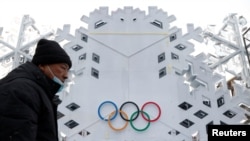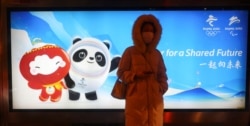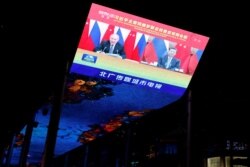On January 18, Sergei Naryshkin, director of Russia’s Foreign Intelligence Service, claimed the United States and some of its allies are planning an “aggressive intervention” to discredit the 2022 Winter Olympics, set to take place in Beijing next month.
Naryshkin said his agency had “quite extensive information on the large-scale campaign launched by the United States and its most odious, obedient allies for aggressive and malicious interference in the preparation of the Beijing Olympics.”
“We see their attempts to discredit the organizers of the Olympic Games in Beijing. The main role in these actions is played by the U.S. Department of State, which coordinates all the anti-Chinese activity on the subject of the Olympics by the non-governmental organizations and media it controls," he said.
“Frankly, we do not see anything new in this practice,” Naryshkin added, contending the same methods were used to discredit Russia on the eve of the 2014 Winter Olympics in the Russian city of Sochi.
The claim that U.S. State Department, with compliant NGOs and media in tow, is coordinating a campaign to discredit the Winter Games, is unsubstantiated. However, it fits into a long-standing narrative by senior Russian figures, who deny that civil society groups and media act autonomously in open societies.
It is true that U.S. government officials last month announced a diplomatic boycott of the 2022 Winter Olympics, citing Beijing’s “ongoing genocide and crimes against humanity in Xinjiang and other human rights abuses.”
While the boycott does not prevent Team USA athletes from competing, Russia criticized it, saying the games should be free of politics.
Allegations of genocide and other human rights abuses against Uyghur and other Muslim minorities in China’s northwestern Xinjiang region have exacerbated tensions between Beijing and the West.
Western media and rights groups have extensively covered and documented the abuses, prompting sporadic calls to boycott the Olympics.
For example, a coalition of over 160 groups, including Tibetan, Uyghur, Southern Mongolian, Hong Kong, Taiwanese, Chinese Democracy and human rights activists, delivered a letter to the International Olympic Committee (IOC) president on September 9, 2020, demanding that it “reverse its mistake in awarding Beijing the honor of hosting the Winter Olympic Games in 2022.”
However, boycott calls have varied. In October 2020, the Associated Press reported that the World Uyghur Congress (WUC) was among groups that had asked the International Olympic Committee to remove the Winter Olympics from China.
Although the AP said the WUC was not then seeking a boycott, Arkin reached out to the Voice of America after publication of this fact check to clarify that the Congress last summer was among the first to call for a diplomatic and a full boycott of the games.
China regularly paints the World Uyghur Congress, which receives funding from the U.S. government-funded National Endowment for Democracy, as a terrorist organization and tool of the West.
Other groups and activists, some of whom call the 2022 Winter Olympics “the Genocide Games,” are seeking a boycott.
Tsela Zoksang, an 18-year-old Tibetan activist, told Teen Vogue: “We postponed the Olympics for a pandemic. I don’t see why we can’t postpone for genocide.”
She added that “genocide has to be a red line,” citing allegations that Uyghurs and others, possibly numbering in the millions, have been put in “modern-day concentration camps.”
The Teen Vogue report challenges the notion that the Olympic Games are “apolitical,” noting that China pressured the International Olympics Committee to only allow Taiwan to compete as “Chinese Taipei.”
Amnesty International China researcher Alkan Akad told Polygraph.info the London-based rights group had not taken a stand on the boycott issue.
“It's quite rare that Amnesty takes a position or calls for boycotts for sports events. We usually wouldn't call for an event not to be hosted in a country simply because of its poor human rights record,” he said.
Still, Amnesty International has stated the Winter Olympic Games provide the world “an opportunity to push for human rights improvements in China.”
In comments to Agence France-Presse, Akad warned against letting Beijing use the Winter Olympics as “a sportswashing opportunity,” noting that promises the Chinese government made during the 2008 Games in Beijing to improve human rights “never materialized.”
Western media organizations have critically covered the upcoming games on a host of issues, but the coverage has hardly been uniform.
Rights groups have also not been uniform in their recommendations. For example, New York-based Human Rights Watch and others have recommended that athletes, for their own safety, not to speak out while in China. Beijing has warned that athletes who violate “Chinese laws and regulations” are “subject to certain punishment.”
But Akad has called on the International Olympic Committee and other bodies to “adequately respect athletes’ and sports officials’ wishes to speak out about human rights, including on issues deemed ‘sensitive’ by the authorities.”
Thus, a variety of independent entities have been providing their own analyses, reactions and conclusions. That runs counter to how some Russian officials see the world.
Senior Russian officials have regularly described the actions of dozens of independent media outlets and civil society groups as coordinated by hostile foreign governments.
As the Carnegie Endowment for International Peace noted in 2017, Russian state media worked to portray Western-funded civil society groups as tools of Western intelligence that seek to “provoke or overthrow the Russian government.”
That view is embodied in Russia’s “foreign agent law,” which has underpinned a government crackdown on journalists, news organizations and civil groups critical of the state.
Maxim Trudolyubov, a contributing editor to Meduza, a Russian- and English-language online newspaper, told NPR:
“The way they perceive civil society is: ‘He who pays the piper, calls the tune’ … They decided for the public that the reason for anything that goes wrong comes from the West, from abroad.”
President Vladimir Putin has expressed the belief that U.S. news media, like their Russian counterparts, are controlled from the top down.
Asked in a 2005 interview about media freedom in Russia, Putin told CBS television’s “60 Minutes” program: “Haven't we seen resignations of leading American journalists from the national media due to their positions on Iraq?”
As noted by CBS, Putin mistakenly believed that Dan Rather had been removed from his position as a CBS anchor over his views on the Iraq War or the 2004 U.S. presidential election.
Rather was still working for CBS and “60 Minutes” at the time of the Putin interview, although he had stepped down as anchor following issues that arose over a “60 Minutes II” story concerning former President George W. Bush’s National Guard service record, which cited potentially forged documents.
Putin had earlier told Bush he thought the former U.S. president had a hand in getting CBS journalists fired. As Time magazine reported at the time:
“But when Bush talked about the Kremlin's crackdown on the media and explained that democracies require a free press, the Russian leader gave a rebuttal that left the President nonplussed. If the press was so free in the U.S., Putin asked, then why had those reporters at CBS lost their jobs? Bush was openmouthed. ‘Putin thought we'd fired Dan Rather,’ says a senior Administration official. ‘It was like something out of 1984.’”
The 2014 Winter Olympics in Sochi was closely scrutinized for its exorbitant cost, corruption, rights issues and a state-sponsored doping scandal that led to Russia being banned from international sporting events.
The U.S. sent an official delegation to Sochi, although senior figures like then-President Barack Obama and then-Vice President Joe Biden did not attend. France, Germany and other countries also declined to send senior government leaders to the games. Those absences were linked to Russia’s passage of a so-called “anti-gay bill.”
Nonetheless, the United States offered to help Russia provide security for the 2014 Winter Games. Russia largely refused that offer.
Clarification: This article has been updated to represent the World Uyghur Congress' current position on a boycott of the 2022 Beijing Winter Olympics.







